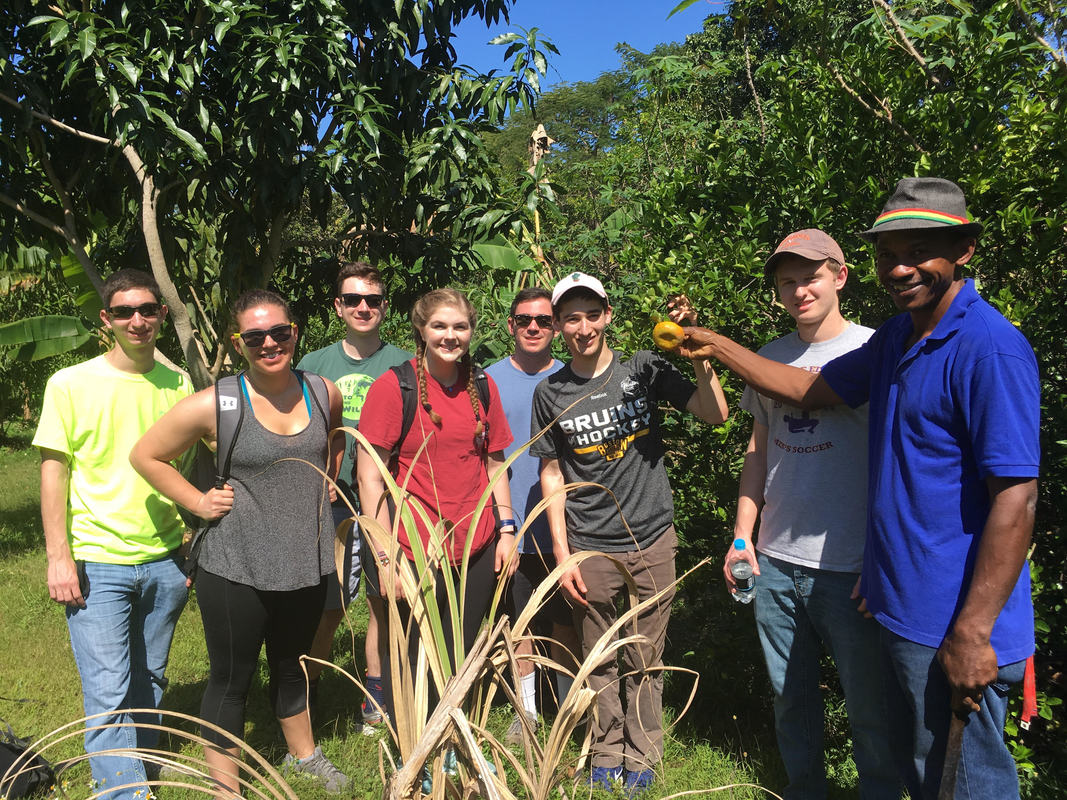|
Today's post is from second year Birthright Intern Colton Sheehan.
Today we took a slight hiatus from working at the school and instead went on a few excursions. We got to sleep in a little before heading off to Bluefields Organic Fruit Farm, where we received a tour from the owner himself. For anyone skeptical of the powers of organic food, the man was 54 but looked half his age and had the nimbleness of an alley cat. He showed us around his garden, which seemed to be chaotic compared to the well ordered farms we are used to, with different plants strewn about haphazardly. He explained that this was a way of resembling nature, a common theme his farming strategy. As we walked among the trees and bushes, he pointed out some of the crops we may never have seen before, such as the nasberry or the Jamaican Apple. We got to try many of these fruits, as well as a coconut fresh off the tree and sugar cane cut from the stalk. To finish the tour, he showed us the view from the top of the hill, an incredible spectacle and the most common draw of tourists to Bluefields. Check out the organic farms Facebook page here:https://www.facebook.com/bluefieldsorganicfruitfarmtours/ We spent the next few hours of the day lounging at Bluefields beach, a local beach that is seldom visited by tourists. The weather was immaculate, the water was marvelously blue, and the sand was perfectly white. It honestly looked like a scene from a postcard. Unfortunately, barely anyone was able to escape the harmful rays of the sun, so we all look a bit more red than we did yesterday. Luckily some still had aloe Vera stalk from the organic farm to rub on their sunburn. While at the beach, we had a long conversation about the idea of “voluntourism” and our definitions of service. For those who may not know, voluntourism is the intersection of volunteering and tourism, in which participants spend their vacation completing volunteer activities while also engaging in tourism (such as going to the beach). There has often been debates about whether or not voluntourism is beneficial, as it takes jobs away from locals and replaces them with potentially unqualified tourists. Objectively, our trip is considered voluntourism, so we had a debate amongst ourselves to determine whether or not we believed we were having the most positive impact we could on the community in which we’re volunteering. And honestly, we generally felt like we really aren’t benefitting the school in the greatest way possible by entering their classrooms and taking over for teachers, which is what we have been told to do. However, I personally feel that what we bring isn’t just the physical manpower, but rather the cultural exchange that comes with immersion. That is a large part of the service we are providing and it has a large impact on the young impressionable kids that probably do not meet many Americans. Even a small interaction can make a big difference. After the beach we went back to have dinner with our host families. We had some down time which I spent playing soccer in the street with some locals. Then we went to a presentation about Rastafari, a religion practiced by some Jamaicans that originated from an Ethiopian King. Finally we ended the night with a culinary arts demonstration, as many of the host mothers taught us how to make the dinners we’ve been receiving over the past few nights. Of course, this involves more eating, as the food we made had to be consumed. Afterwards we went home for the night and prepared to go back in the classrooms the next morning. Thanks for reading and we’ll be back tomorrow with another blog post! Lata! Comments are closed.
|
The Brody Jewish Center, Hillel at the University of Virginia, is the focal point in a renaissance of Jewish life for the 1,000 Jewish students on Grounds. Archives
September 2021
Categories
All
|

 RSS Feed
RSS Feed